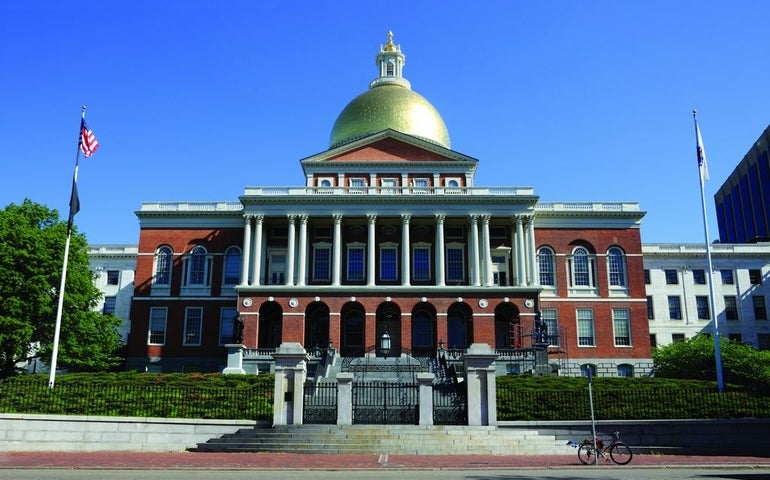Every city in Massachusetts has one or two, and in Lawrence, there are hundreds, Mayor Daniel Rivera said Thursday: vacant properties that aren’t being developed, because their owners are tied up in land court or the ownership is otherwise unclear.
“They’re either zombie properties or in bureaucratic no-man’s land, where people really can’t access them,” Rivera said. “As you can imagine, as you know, this creates a situation where these properties sit idle and dormant. They’re a threat to harbor vice, vagrants, most likely, and in cities they become a threat for arson, they don’t just take down the property that they have, they take down the properties around them.”
Rivera appeared before the Community Development and Small Business Committee, pitching lawmakers on a bill that aims to make it easier for blighted and abandoned properties to return to the housing market and boost struggling neighborhoods in the process.
The Lawrence mayor said walking by the same vacant building for years can result in “a sense of hopelessness in despair” for neighbors and send a message “that no one cares.” Revitalizing those vacant properties into new housing, he said, could strengthen communities.
Filed by Rep. Antonio Cabral, the bill (H 177) would form a commission to study strategies for improving the quality of housing stock in weak markets, task the Executive Office of Housing and Economic Development with developing a “capacity building program” to help cities and towns with neighborhood stabilization and housing improvement efforts, and create a “spot blight rehabilitation program” focused on abandoned and vacant residential properties.
It would also increase the cap on the state’s Housing Development Incentive Program and add neighborhood stabilization to the list of “guiding principles” for the Massachusetts School Building Authority.
Cabral, the co-chair of the Gateway Cities Caucus, said the spot blight program would involve altering the state law that allows urban redevelopment corporations to use eminent domain to acquire blighted properties in certain circumstances.
“The statute right now is quite cumbersome for small properties,” the New Bedford Democrat said. “It works for big properties, big projects, but when you’re talking about single-family homes or a three-decker or a two-decker, it’s just not practical the way it is now. It takes years to get this done, and this is blighted properties, abandoned properties.”
Cabral said the bill would “help communities put abandoned properties back on the market in a cost-effective manner and within a reasonable timeframe.” He said abandoned properties are threatening the overall quality of life in the state’s former industrial centers, where downtowns have benefited from revitalization efforts but other neighborhoods still face challenges.
A companion bill (S 1627), filed by Sen. Brendan Crighton, was on the agenda for a Revenue Committee hearing on Tuesday.
Lawmakers on the Community Development Committee questioned supporters about the bill’s eminent domain question, and the possible unintended consequence of gentrification.
Sen. Diana DiZoglio, a Methuen Democrat who co-chairs the committee with Rep. Ed Coppinger of Boston, said she was “concerned about the property tax rate of the neighbors and the impact of potential gentrification of that neighborhood” if a formerly abandoned property is improved as envisioned by the bill.
Brockton economic development director Rob May replied that he was “more concerned, quite frankly, about that un-rehabbed property dragging down the property values of the rest of the community.”
“In Brockton, while we have seen property values rise, we have not come back to the 2008 level right now, so people are underwater on a lot of their properties,” he said. “But the effect of blight both on the financial stability of the neighborhood, on the emotional and health concerns of the neighborhood, are far greater than rehabbing a property. We’re not talking about putting in a Beverly Hills-style home.”
Rep. Lenny Mirra said he agreed with the goal of the bill and would “like nothing better than to see those properties turned into good housing.” The West Newbury Republican said, though, that he believed eminent domain “seems kind of a rash and kind of an extreme way of attaining these goals.”
“Eminent domain is for a particular purpose,” Mirra said. “It’s when the government takes property to use it for something else, and it seems like we’re using it here to take a property and keep it in the same use, in this case housing. Don’t municipalities also have the means of condemning a property and putting time limits on the owners to make the repairs to that property?”
Michael Moriarty, executive director of the One Holyoke community development corporation, said municipalities face “many, many barriers to a timely turnaround,” and that going through the land court process to transfer a title is “glacial.”
Joe Kriesberg of the Massachusetts Association of Community Development Centers said bill supporters understand eminent domain is a “big deal” and that “critical safeguards” need to be in place. He said the bill would involve “tremendous oversight” from municipalities and the Department of Housing and Community Development.
“This isn’t a casual thing, but at the same time, we need it to work in a timeframe that allows us to get these properties before they’re so deteriorated that they can’t be saved,” he said.

